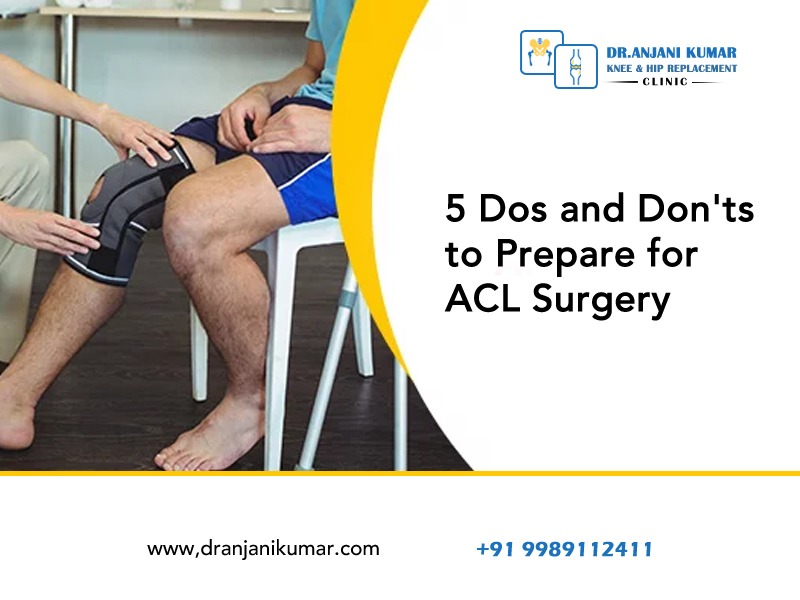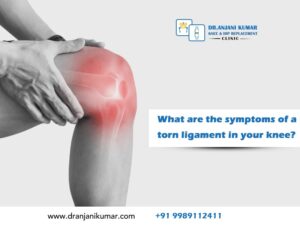An anterior cruciate ligament (ACL) surgery is a surgical technique used to replace an ACL in the knee that has been damaged or ruptured. One of the key ligaments of the knee is the ACL, which works to stabilise the joint and limit excessive movement of the tibia (shinbone) with the femur (thighbone).
The torn or damaged ACL is removed during surgery and replaced with a graft derived from a patient’s body or donor tendon. Typically, screws or other devices are used to secure the graft to the knee’s bones, and sutures or staples are used to close the wound.
To assist the patient in restoring strength and mobility in the knee, the patient will need to go through a phase of rehabilitation that includes physical therapy and exercise. The type of surgery done and the individual’s unique situation will determine the length and intensity of the recovery.
For whom is ACL surgery recommended?
For those who have had a complete tear or rupture of their anterior cruciate ligament (ACL) in the knee, ACL surgery is frequently advised. Sports or physical activities that call for sudden pauses, pivots, or direction changes result in this injury.
Surgery may be advised if someone has symptoms like knee instability, pain, or trouble walking or engaging in activities.
It’s vital to remember that not every person who tears their ACL needs surgery. Other patients with less severe injuries, such as partial tears, might be able to control their symptoms with rest, physical therapy, and other non-surgical procedures.
The choice to have ACL surgery is often made following a careful examination by a medical professional and a discussion of the advantages and disadvantages of the procedure.

ACL surgery’s general dos and don’ts are as follows:
Do’s for ACL surgery:
- Both before and after the procedure, carefully follow the directions given to you by your healthcare practitioner.
- Keep up with your doctor’s follow-up appointments to track your development and handle any issues.
- To aid in regaining knee strength and mobility, adhere to a rehabilitation programme that includes physical therapy.
- To lessen discomfort and speed up the healing process, control pain as instructed by your healthcare professional.
- To prevent putting weight on the injured knee, use crutches or other mobility aids by your doctor’s instructions.
Don’t’s to prepare for an ACL surgery
- Don’t start a vigorous activity like sports or exercise until your doctor gives the all-clear.
- Disregard any infection-related symptoms, including fever, redness, or discharge from the wound site.
- Stop using any supplements or drugs without first talking to your doctor.
- As directed, without wearing braces or other supportive devices.
- Use tobacco products or smoke, as this can hinder the healing process.
Your circumstances may change the precise instructions and regulations for your ACL surgery. Therefore, carefully following your healthcare provider’s guidance is critical to guarantee a successful conclusion.
How to prepare for ACL surgery?
Some crucial procedures must be taken before ACL surgery to guarantee a positive outcome and a quick recovery.
- Your healthcare practitioner should be informed of your medical history and any medications you are now taking. Ensure that you are healthy and that any medications that might conflict with the procedure or the anaesthetic are changed or stopped.
- Follow any pre-surgery instructions given to you by your doctor, such as those that involve fasting before the procedure or taking a particular medicine.
- Make sure you have a comfortable location to relax, easy access to necessities like prescriptions and crutches, and help with chores like cooking and cleaning as you prepare your home for recovery.
- To assist you in preparing for the procedure and gaining an understanding of what to anticipate throughout your recovery, go to any pre-surgical education sessions or physical therapy appointments that your healthcare physician suggests.
- A loose-fitting outfit, ice packs, and pillows to elevate your leg are all things you should have for your rehabilitation and other necessities.
By following the steps outlined below, you can ensure the best outcome for your ACL surgery.
Recovery from ACL surgery
The rehabilitation from ACL surgery can take several months, and how quickly the patient recovers will depend on several variables, including the severity of the injury, the type of surgery, and the patient’s overall health and level of fitness.
Endorse a rehabilitation plan: After ACL surgery, physical therapy and exercise are crucial. As your doctor advises, following a rehab regimen that includes exercises to increase flexibility, strength, and balance can fasten recovery and enhance results.
Control swelling and pain: After ACL surgery, pain and swelling are typical and can hinder healing. Observe the pain-management recommendations given to you by your doctor, which may include taking medicine, using cold packs, and elevating your leg.
Healthy diet plan: A balanced diet provides your body with the resources to heal and recover from surgery. Your priority should be a diet of fruits, vegetables, complete grains, and lean protein.
Adequate rest: Getting adequate sleep is critical, so your body can repair and regenerate. Ensure you get enough sleep and avoid activities that could harm your knee.
Avoid activities that could slow recovery: Some activities could slow healing after an ACL operation. Run, jump, or pivot away from them until your healthcare professional gives the all-clear.

Depending on the patient and the unique circumstances of their accident and treatment, ACL surgery can differ. Always consult your healthcare physician for specific advice on accelerating your ACL healing.
Knee replacement surgery may be recommended in advanced cases, especially if the joint has collapsed or the bone has become severely deformed.
Dr Anjani Kumar has 20 years of experience and successfully performed 2000 knee replacement surgeries, 350 hip replacement surgeries, and 500 pelvic acetabular surgeries throughout his career. Please get in touch with us on Mobile: at +91 9989112411 and by E-mail: anjanikumar@ gmail.com




